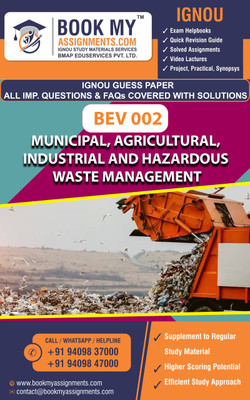IGNOU BEV 002 Municipal, Agricultural, Industrial and Hazardous Waste Management | Guess Paper | Important Question Answer |Certificate in Solid Waste Management (CSWM)(Paperback, BMA Publication)
Quick Overview
Product Price Comparison
Municipal Solid Waste Management (MSW):Overview of MSW composition, generation rates, and characteristics.Collection methods and systems for MSW, including curbside collection, transfer stations, and sorting facilities.Treatment options for MSW, such as landfilling, composting, recycling, and waste-to-energy incineration.Landfill management practices to minimize environmental impacts and maximize resource recovery.Recycling programs and initiatives for diverting recyclable materials from landfills.Challenges and opportunities in municipal solid waste management, including waste reduction strategies and public education campaigns.Agricultural Waste Management:Types of agricultural waste, including crop residues, animal manure, and agro-industrial byproducts.Sustainable management practices for agricultural waste, such as composting, anaerobic digestion, and biochar production.Integration of agricultural waste management into sustainable farming practices and circular economy principles.Environmental benefits of proper agricultural waste management, including soil fertility improvement and greenhouse gas mitigation.Challenges and barriers to effective agricultural waste management, including financial constraints and lack of infrastructure.Industrial Waste Management:Types of industrial waste generated by various industries, including manufacturing, mining, and construction.Regulatory requirements and industry standards for industrial waste management, including hazardous waste identification and handling.Pollution prevention strategies and waste minimization techniques to reduce industrial waste generation.Treatment and disposal options for industrial waste, including recycling, treatment plants, and secure landfilling.Best practices for industrial waste management, including pollution control measures and environmental monitoring.Hazardous Waste Management:Definition and classification of hazardous waste based on its properties, toxicity, and risk to human health and the environment.Hazardous waste identification, characterization, and management practices in industrial, commercial, and healthcare sectors.Legal and regulatory frameworks governing hazardous waste management, including hazardous waste manifesting, transportation, and disposal regulations.Treatment technologies for hazardous waste, including chemical treatment, thermal treatment, and stabilization/solidification processes.Hazardous waste recycling and recovery options, such as solvent recovery, metal reclamation, and energy recovery.Emergency response and spill containment measures for hazardous waste incidents, including spill prevention plans and emergency preparedness training.

